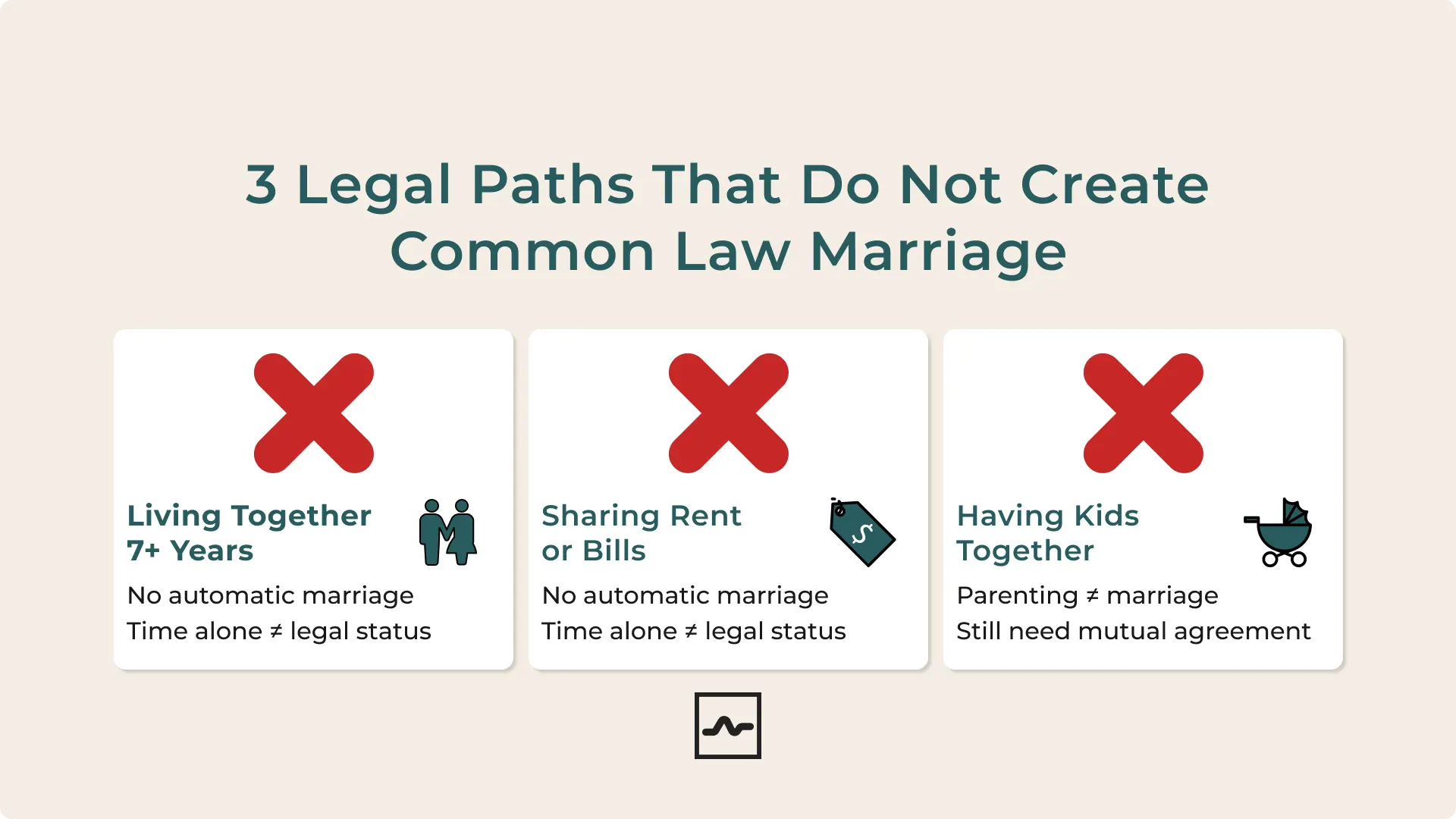Texas recognizes common law marriage, but specific conditions must be met under Texas family law. Many couples unknowingly enter into an informal marriage, while others struggle to prove their common law marriage existed when needed for legal purposes.
As San Antonio Family Attorneys who are experienced in the field, we help clients determine their marital status and protect their legal rights. In this guide, you'll learn about the requirements to establish common law marriage, how to prove common law marriage, and the legal consequences that follow.
What Is Common Law Marriage in Texas?

According to the Texas State Law Library, common law marriage, also known as informal marriage, is a legally recognized marriage without a formal ceremony or marriage license. Texas law allows couples to create a legal marriage through their actions and agreements rather than a ceremony.
This type of marital relationship carries the same legal weight as traditional marriage under Texas statutes. Common law married couples have the same rights as a traditionally married couple in all legal matters.
Three key requirements for Texas common law marriage:
- Agreement to be married (mutual consent) Both parties must agree to be married and consider themselves husband and wife, not just living together or dating.
- Living together as spouses The couple must cohabitate as a married couple would, sharing a household and presenting a unified domestic life.
- Representing yourselves as married to others You must hold yourselves out publicly as a married couple through words, actions, and conduct.
Important note: Living together for an extended period of time does not automatically create common law marriage — this is a common misconception. Under Texas law, all three elements must be present simultaneously to establish common law marriage.
Meeting all three criteria creates a valid legal marriage with full legal consequences. Once established, your informal marriage has identical legal status to ceremonial marriage.
Couples can also visit the county clerk’s office to complete and have filed/registered a form to designate their informal marriage. This form will allow the couple to record the date they became informally married, and it is prima facie evidence of the marriage of the parties.
How Texas Courts Determine Common Law Marriage
When disputes arise over whether a common law marriage existed, Texas courts examine specific evidence to determine whether the three requirements were met. Courts analyze the totality of circumstances rather than relying on any single piece of evidence.
Texas courts weigh different types of evidence based on their reliability and relevance to the three legal requirements. No single piece of evidence is conclusive, and courts look at the totality of circumstances surrounding the relationship. Intent matters more than duration as couples can establish common law marriage quickly if they meet all requirements, while others may cohabitate for years without creating a legal marriage.
Legal Rights and Responsibilities of Common Law Spouses
Common law spouses have identical rights and obligations as traditionally married couples under Texas law. Once your informal marriage is established, you gain the same legal protections and responsibilities as any married couple.
Key legal rights and responsibilities:
- Property rights (community property applies) Texas is a community property state, meaning property acquired during the marriage belongs to both spouses equally.
- Medical decision-making authority Common law spouses can make medical decisions and have hospital visitation rights for their partner.
- Inheritance rights without a will If one spouse dies without a will, the surviving spouse inherits according to Texas inheritance laws.
- Tax filing status options Common law married couples can file joint tax returns and claim married filing status with the IRS. Filing a joint tax return under married status is commonly used to substantiate a claim of informal marriage in Texas.
- Insurance and benefit eligibility Spouses can be added to health insurance policies and named as beneficiaries on life insurance policies and retirement accounts.
- Parental rights Both spouses are legal parents of children born during the common law marriage, with full custody and support rights.
- Divorce requirement if the relationship ends Common law marriages must be dissolved through formal divorce proceedings, including property division and spousal support determinations.
Important note: These rights include hospital visitation, social security benefits, and employer benefits eligibility. Common law spouses also share financial responsibility for debts accumulated during the marriage.
Common law marriage creates the same legal framework as traditional marriage, with both benefits and obligations. Understanding these consequences helps couples make informed decisions about their relationship status.
Proving Your Common Law Marriage: Documentation and Evidence
Proving an informal law marriage can be challenging, but building a strong evidence portfolio significantly improves your chances. According to section 2.401 of the Texas Family Code, the key is collecting evidence that demonstrates all three legal requirements were met during your relationship.
Financial Documentation
Joint financial arrangements provide strong evidence of a marital relationship. Texas courts view shared financial responsibilities as powerful indicators that couples intended to be married.
Filing joint tax returns is particularly compelling evidence, as it requires both parties to declare their married status under penalty of perjury.
- Joint bank accounts, credit cards, loans
- Joint tax returns filed as married
- Insurance policies listing the spouse as the beneficiary
- Joint mortgage or lease agreements
Social and Public Evidence
How you presented yourselves to others demonstrates the "holding out" requirement. This evidence shows you represented yourselves as a married couple in your community.
- Wearing wedding rings
- Testimony from friends and family that you introduced one another as “husband” or “wife”
- Celebrating an anniversary each year
- Using the same surname
- Photographs from family events, holidays
- Social media posts referring to spouse
Legal and Official Documents

Official records create a paper trail of your marital relationship. These documents show you consistently presented as married in formal situations.
Consistency across multiple legal documents strengthens your case significantly. One spouse cannot establish common law marriage alone — both parties' actions matter.
- Hospital records listing spouse as emergency contact
- Employer records showing spouse as beneficiary
- Voter registration with the same address
- Joint memberships or subscriptions
Comprehensive documentation is crucial because different pieces of evidence work together to build a convincing case. Missing or conflicting evidence can weaken your claim, so maintain organized records from the earliest date of your relationship.
Сommon Law Marriage and Children
Common law marriage affects parental rights and child-related legal matters under Texas family law. Understanding these implications helps protect your children's interests and your parental rights.
Key parental rights and responsibilities:
- Both spouses are legal parents of children born during the common law marriage Children born during a marriage, whether formal or informal marriage, are presumed to be “of the marriage”.
- Child support obligations If marriage ends Both parents remain financially responsible for children, requiring formal child support orders through divorce proceedings.
- Custody rights in divorce proceedings Common law spouses have equal standing in child custody determinations, just like traditionally married couples.
- Inheritance rights for children Children of common law marriages inherit from both parents under Texas law, regardless of whether parents had a formal ceremony.
- Medical decision-making authority Both common law spouses can make medical decisions for children and access school records.
- Paternity establishment differs significantly In unmarried relationships, fathers must establish paternity through legal proceedings or vital statistics forms, while common law marriage automatically establishes both parents' rights.
Common law marriage provides important legal protections for children and simplifies many legal processes. Children's legitimacy and legal status are never questioned when parents have an established common law marriage.
Dissolving a Common Law Marriage
Common law marriages must be formally dissolved through divorce proceedings, identical to traditional marriages. Simply separating or moving out does not end your legal marriage under Texas law.
Legal Requirement for a Formal Divorce
Texas requires formal divorce papers to dissolve any legal marriage, whether ceremonial or common law. Without proper divorce proceedings, you remain legally married regardless of separation.
Important note: Attempting to remarry without a formal divorce constitutes bigamy under Texas statutes.
Division of Community Property

All marital property acquired during the common law marriage must be divided equitably. This includes real estate, bank accounts, retirement funds, and debts accumulated during the marriage.
Spousal Support Considerations
Common law spouses may be entitled to spousal support based on factors like marriage length, earning capacity, and financial need. Courts apply the same standards used for traditional marriages.
Child Custody and Support
Child custody and support determinations follow identical procedures as traditional divorce cases. Both parents retain rights and responsibilities regardless of how their marriage was formed.
Timeline and Procedures
Common law divorce follows the same timeline as traditional divorce, with a minimum 60-day waiting period. The process requires proper legal filings and court appearances.
Costs Involved
Divorce costs remain consistent whether dissolving common law or traditional marriages. Factors affecting cost include property division issues, child custody disputes, and whether parties reach agreements.
If the existence of a common law marriage is disputed, this will likely add cost to your case because it will require the attorney to do additional work on the issue, such as discovery, depositions, motion practice, and/or hearings.
Protecting Your Rights: When to Seek Legal Counsel
Texas recognizes common law marriage with specific requirements, and proof can be challenging but achievable with proper documentation. The legal consequences remain identical to traditional marriage, affecting property rights, parental rights, and financial obligations.
As trusted family law attorneys, Lishman Law provides clear guidance through the most challenging marital situations and family law matters. Contact us today to schedule your free case evaluation and protect your family's future with confident legal representation.

Sarah Anne Lishman is Board Certified in family law. Our other attorneys are also experienced with informal marriage claims. Uncertain about your marital status or property rights? Contact Lishman Law's experienced San Antonio family attorneys today to discuss your specific situation and protect your legal interests.






.avif)




